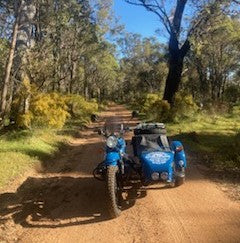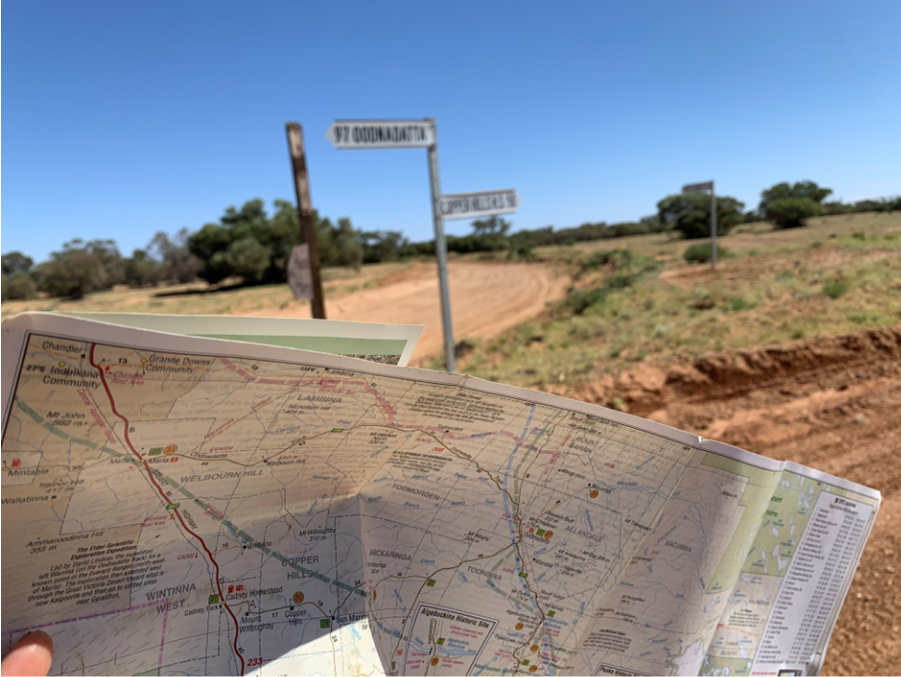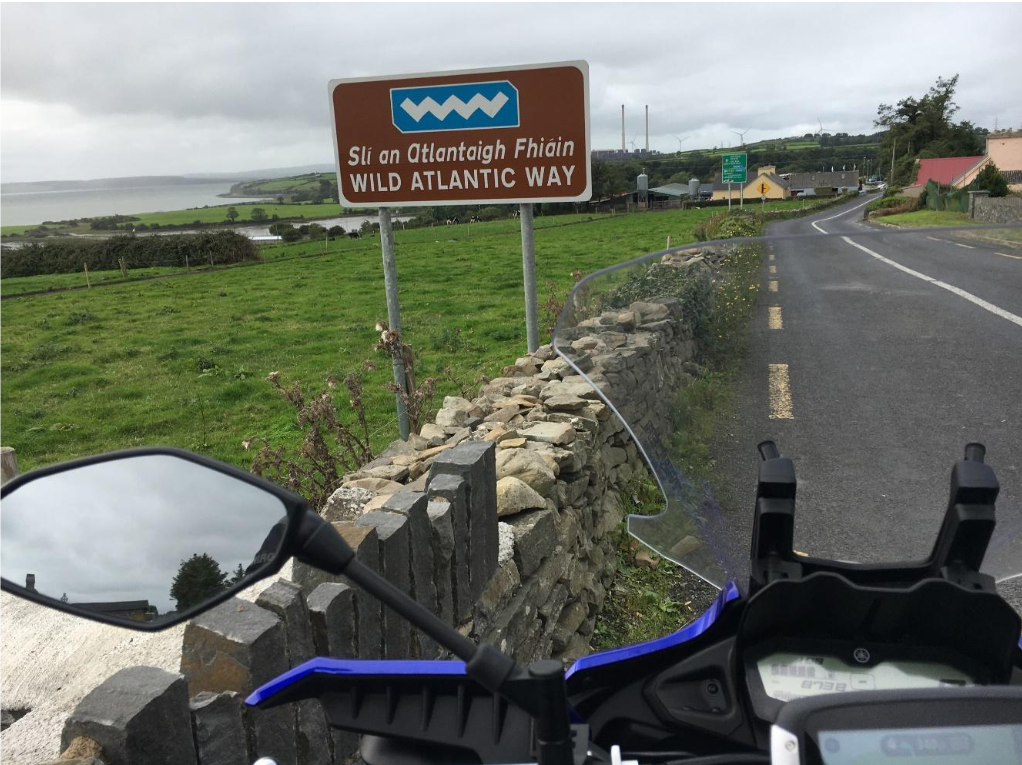It’s not (all) about the destination…
Written by Janelle White
I was first told about the emu by a Yamatji Elder, my friend and colleague. He explained that when you saw the bird in the night sky, it was time to go hunting for emu eggs.
We were camped at the end of the Gunbarrel Highway and I’d been busy looking at the stars, but as my friend explained it was the space between that provided the emu its form. I’d been focusing on the parts, at the expense of the sum. I was reminded of the tendency to concentrate on the destination at the expense of the journey. If it’s one thing travelling long distance on two wheels has taught me, it’s the importance of the journey.
------------------
I was convinced my great, great, great grandfather was riding pillion as I skirted Lough Erne and headed down the Wild Atlantic Way. How else to explain the uncanny synchronicity, the numerous serendipitous moments encountered on this trip around the Isles. I’d been chasing ancestors for the past month and as I boarded the ferry in Dublin and headed back across to Wales, I reflected on the last week spent in pursuit of my Irish convict ancestor’s story. His final destination may have been the Upper Hunter Valley in NSW, but his journey was extremely circuitous and certainly eventful.

My hired Yamaha Tracer 750 on the Ring of Kerry
David Moore was transported to Australia in 1830 for the crime of stealing 4 pieces of wood. David lived and worked in the county of Fermanagh in Northern Ireland, around a beautiful area of mystical lakes associated with the Erne River, known as Upper and Lower Lough Erne. Born around 1786, David was employed as a boatman by Alexander Saunderson on an estate on the Upper Lough. The Saundersons owned plantations in the area (ie. land colonised in the Irish province of Ulster by people of Great Britain during the reign of King James I). The lough offered the main form of transport for people and produce at the time.
In 1829, David was found guilty of larceny and sentenced to 7 years' transportation. However, he escaped from Cavan prison and managed to sail to America! But in January 1830 he was recaptured, when he worked his passage back to Ireland and was recognised in County Fermanagh where he had re-united with his wife and family. He was subsequently transported to Australia.
Motorcycle Diaries, Day 8: Cavan to Belmullet
Well, another part of the past has been revealed and I've spent the day tracing David’s life as a boatman on the Upper Lough Erne. I visited a neighbouring plantation castle, Castle Crom, where an annual cot race was happening! Cots are Irish traditional wooden boats used on the inland waters of County Fermanagh. Flat-bottomed to glide through shallow waters, they were used to transport people and livestock. The Upper Lough Erne Historical Society happened to be at the castle today and kindly invited me to have a row, just as my GGG-Grandfather would've back in his day!

Cotting – it’s obviously in the genes
Lough Erne was an important area of transport and movement of people from ancient times. The surrounding landscape and islands have evidence of early Christian places of worship, and the lough itself was a pilgrimage path, when there were few roads. Crannogs (artificial island dwellings) have also been found in the surrounding loughs, and mythical Yew trees abound - quite the magical place! David would likely have been looking after the boats and transporting feed for sheep and cattle around the various islands, as well as collecting turf for fuel. The family he worked for were inaugural members of one of the oldest yacht clubs in Ireland, and so it seems his skill at sea, (officially recorded during transportation to Australia), was a direct result of his everyday life on the lough.
As I make my way back to the coast, I pass a village and feel a distinct presence. It’s the village of Derrygonnelly, famed for an annual Celtic fiddle festival. I later discover this was the village where my ancestor David was born.
Motorcycle Diaries, Day 9: Belmullet to Galway (via Achill Island)
Rode the 'Wild Atlantic Way' today, and parts of it certainly were wild - especially the wind! Fortunately, the weather managed to stay 'relatively' dry, so I could enjoy the magnificent coastal scenery! Had to give way to black-faced sheep and curious cows; overtake a uni-cycling backpacker(!!); pass signs advertising seaweed baths; watch surfers catch Atlantic waves while hikers walked the same beaches wearing beanies; skirt dramatic fjords and mountains in Connemara; fuel up on Irish whiskey and coffee cake (yum!); pass through the Galway Gaeltacht (where the Irish language, Gaeilge, rules); and learn what 'tattie hokers' were! (ie. people who sailed to Scotland each summer to help with the potato harvest)


A mixture of road surfaces on Achill Island
Motorcycle Diaries, Days 10 & 11: Galway to Watervale, via Killarney
Two long, but rewarding, days in the saddle! Left Galway, after checking out the Craic in the local Latin Quarter the night before (Irish music - both traditional and contemporary). Porridge with Irish mist-infused honey and sheep yoghurt provided a power-packed brekkie! Followed by scones at 'Bake My Day' cafe, I was certainly well-fuelled. Travelled south through County Clare to cross the Shannon Estuary by car ferry into County Kerry. The wild peninsulas are home to more Gaeltacht communities, with the houses sheltering between boulders and the occasional white sand beach. Dingle Bay and the Ring of Kerry rides provide plenty of coastal eye-candy.

The road to Dingle, County Kerry

Dingle
When David Moore arrived in Australia, he was put to work as an indentured labourer in the Hawkesbury River region. After 7 years, he sailed back to Ireland to retrieve his poverty-stricken family and encourage them to emigrate to New South Wales. The family settled in the Upper Hunter town of Wollombi, … and the rest, as they say, is history!
------------------
I still search for the emu in the night sky, when the Milky Way is bright and the light pollution minimal. I’ve also since set my sights on one day returning to play at the Derrygonnelly Fiddle Festival in Northern Ireland, as a form of intergenerational tribute to my ancestor. But for the moment, I need to concentrate on the every day - ie. keeping up the practice! – while constantly reminding myself that it’s not all about the destination…






Leave a comment